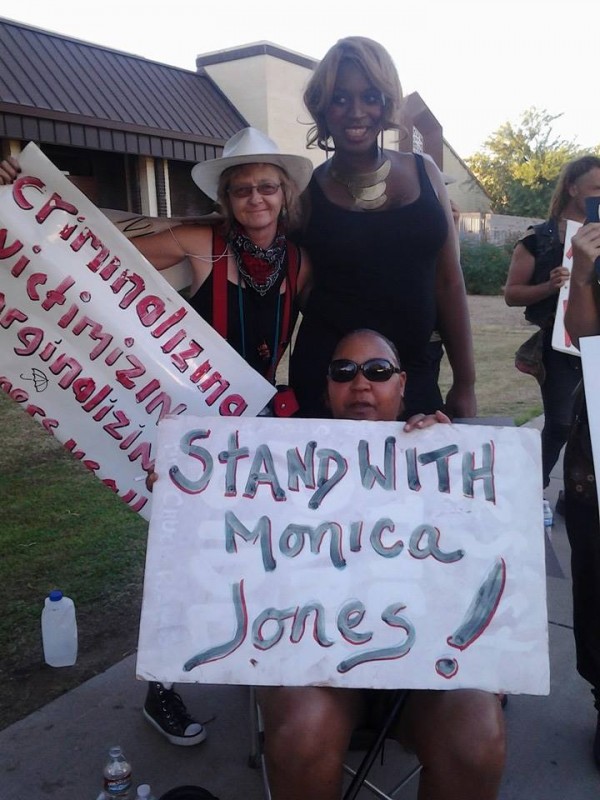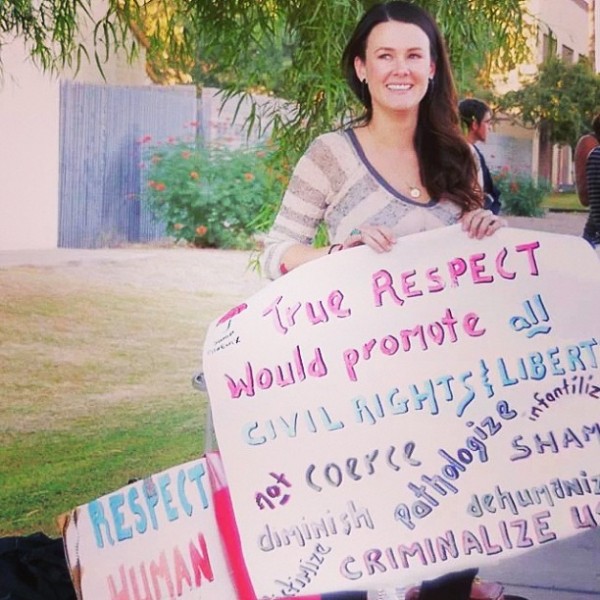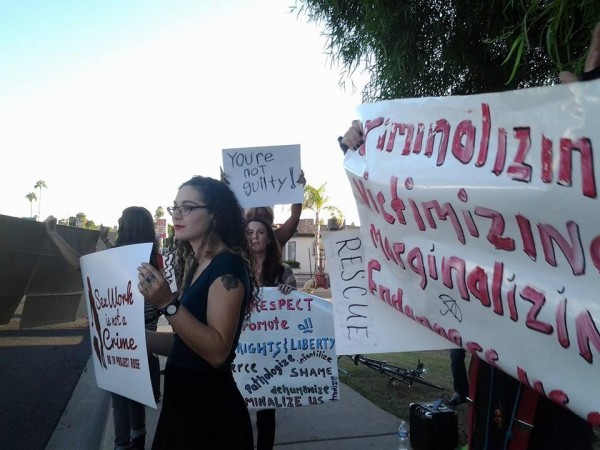----------------------

Monica Jones with other SWOP-Phoenix members (Photo by Margie Diddams, courtesy of SWOP-Phoenix)
One of your members, Monica Jones, was arrested for “manifestation of prostitution” after participating in the protests against Project Rose. Jones was in the diversion program before, and spoke eloquently about her experience being mistreated there as a trans woman and a student sex worker. Can you tell me more about her case?
We believe Monica was targeted by the Phoenix police department. The evening after she spoke at the protest she was walking to a bar in her neighborhood. She accepted a ride from what turned out to be an undercover cop. He began to solicit her and she warned him he that he should be careful because of the Project ROSE stings that were going on that evening. He kept propositioning her and she asked to be let out of his vehicle. He did not let her out and actually changed lanes so she couldn’t exit the car. She was frightened and thought she was being kidnapped (which she was). She asked him if he was a cop, because she didn’t want to assault an officer. They were pulled over for a “routine traffic stop” and she was placed under arrest for the intent to manifest prostitution.
What was SWOP-Phoenix’s response when you first heard about Project ROSE? What would you say to those who claim that diversion is at least an improvement over wholesale incarceration?
When I heard about Project ROSE through an activist friend I set out to interview the professor at the ASU School of Social Work who spearheaded the initiative, Dr. Dominique Roe-Sepowitz. As a researcher, I tried my best to go into the interview unbiased until I had all of the details. Upon completing the interview I confronted Dr. Roe-Sepowitz about what I felt was wrong with Project ROSE, particularly the inherent contradiction of fighting coercion with coercion. Dr. Roe-Sepowitz explained that the initiative is completely police-driven. The School of Social Work has community organizations meet the apprehended community members at the initiative’s command post at Bethany Bible Church. The arrestees are met with prosecutors, as well as “tour guides,” who are ex-sex workers, and are told that they can have access to hygiene products, a hot meal, clothing, detox, mental healthcare, healthcare, safe housing and more, if they meet the eligibility criteria. After the interview, I compiled the research and met with a couple of activists from the Phoenix Harm Reduction Organization to discuss what we should do about it. They knew some folks from SWOP Tucson (who are incredible and have been supportive and essential in the creation of the Phoenix chapter) and SWOP PHX was formed as an emergency response. We immediately reached out to other activists and organizations, such as members of [immigrant rights organization] Puente and Arizona Prison Watch, and began to strategize. We found out the exact dates of the next stings and began street and internet outreach to inform workers of the impending raids, handing out pamphlets and Know Your Rights information. We also protested outside of the Project ROSE command post, Bethany Bible Church.
Diversion is not an “improvement” in any way. Research states that there is little, if any, evidence of diversion initiatives helping sex workers or reducing prostitution rates. Those involved in creating diversion initiatives want people to believe that they are an improvement because they benefit from it due to special interests. Social workers and non profit organizations stand to benefit from diversion projects through the creation of jobs, grants, other funding and publication. The Project creates good publicity for the police department, and offers the police more billable hours in the form of opportunities to travel to train other police departments in the treatment of sex workers as victims. Project ROSE actually widens the net of the prison industrial complex by pushing individuals into the system. The police department organizes more stings and raids, and since most of those arrested are ineligible for diversion or do not complete it successfully, they are then funneled back into the criminal justice system. The organizations involved should be ashamed because they scare away the oppressed and marginalized populations they seek to serve by using police force. This creates fear within these communities and exacerbates danger because individuals cannot trust their local resources and so sex work is driven further underground.
Diversion programs and criminalization mainly target street based sex workers and trans sex workers. These community members are already targeted, marginalized and oppressed. Profiling laws like the manifestation statute only seek to reinforce and justify this discrimination. Diversion and criminalization perpetuate the stigma against street sex workers and trans sex workers as well as reinforce racism, sexism, and transphobia.

Jaclyn Moskal-Dairman at a SWOP Phoenix protest (Photo by Margie Diddams, courtesy of SWOP-Phoenix)
Jones was deemed “ineligible” for diversion. What
does that mean—does that translate into not being repentant enough about
being a sex worker? She was arrested for “manifestation of
prostitution”—what does that legally mean?
Monica was “ineligible” for diversion because she had already been through a similar diversion program titled DIGNITY House through Catholic Social Services. She was told to not come back to that particular program after only a few days because she was very outspoken about how they treated her as a victim and she told the people in charge as well as other individuals in the program that she has the right to her own body.
The Phoenix manifestation law is a municipal statute which states that “[a] person is guilty of a misdemeanor (prostitution, soliciting an act of prostitution and related offenses) [if they are] in a public place, a place open to public view or in a motor vehicle on a public roadway and manifests an intent to commit or solicit an act of prostitution. Among the circumstances that may be considered in determining whether such an intent is manifested are: that the person repeatedly beckons to, stops or attempts to stop or engage passersby in conversation or repeatedly, stops or attempts to stop, motor vehicle operators by hailing, waiving of arms or any other bodily gesture; that the person inquires whether a potential patron, procurer or prostitute is a police officer or searches for articles that would identify a police officer; or that the person requests the touching or exposure of genitals or female breast.”
We feel that this statute clearly violates rights to free speech and is unconstitutionally vague. It gives the police permission to profile sex workers.
Can you explain how the ASU School of Social Work’s spearheading this diversion program goes against the ethical guidelines of social work?
Using police force as an impetus to coerce and force individuals into services strips them of their autonomy. By disregarding the principle of self-determination, Project ROSE violates many standards of social work practice 1 The Project reiterates the ideal that marginalized groups need constant surveillance. It perpetuates the “this is for your own good” ideology which, in the social work field, has historically created oppressive consequences.
Some sex workers found fault with the wording of SWOP-Phoenix’s statement that diversion programs “ignore the fact that many people who work in the sex industry are not victims in need of rescue, but consenting adults who should not be arrested, coerced into diversion, or incarcerated for working,” saying that trafficking victims shouldn’t be arrested or coerced into diversion either. Monica Jones was quoted saying, “I’m not on drugs. I’m not like one of these crazy people.” Surely SWOP-Phoenix doesn’t believe that sex workers who are drug users, sex workers with mental illness diagnoses, and sex workers who are in coercive situations deserve to be criminalized or forced into Project Rose?
In May we had only just begun to come together as a community to organize and we were placed under tremendous pressure by the impending citywide stings that we knew would lead to a very large number of people being incarcerated. And here in Arizona, when people are incarcerated their very lives are at stake. In a fast-moving situation like this sometimes messages are not as clear as they should be, and lessons are learned every time communities stand up for rights. All of the activists in Phoenix working on this issue would like to say here and now that we don’t agree with ANYONE being arrested and coerced in order to be “helped,” whether they identify as sex workers or trafficked persons.
As to the second part of your question, the comment you quote Monica making was from her speaking off the cuff at the protest in May. I feel as if her comments are being taken out of context. She was speaking about her experience in solitary confinement where because of her gender she was stigmatized as a “crazy person who needed to be isolated.” And to be clear, I am not implying that all individuals in solitary confinement are crazy, and I acknowledge that solitary confinement can wreak havoc upon one’s psychological and physical health. Monica’s comment also referred to how she was treated in diversion (she is not struggling with substance abuse issues, so why was she forced into drug counseling?) I think closer consideration of Monica’s real intent actually highlights the inherent problem with diversion initiatives: these programs completely lack a nuanced analysis of our community members’ individual lives. By treating ALL sex workers as victims and generalizing their personal needs, the Project perpetuates stigma and stereotypes which convey that all sex workers are helpless victims in need of forced detox, forced drug counseling, forced mental healthcare, etc. Diversion programs like Project ROSE stand in direct opposition to powerful harm reduction based and rights affirming substance abuse and mental health approaches, the kind that actually help make a difference.

Marcia Powell RIP (Photo by Gary Millard, 2008, courtesy of SWOP Phoenix)
According to Peggy Plews, an Arizona Prison Watch member, Marcia was a 48-year-old sex worker diagnosed with mental illness, with a long history of drug and prostitution convictions and no family willing to claim her body once she was gone. She got 27 months for offering a cop a $20 blow job, serving much of it on the maximum security yard at Perryville. Marcia was supposed to be on a ten minute suicide watch when she was left in an uncovered cage, largely ignored, for nearly four hours in the mid-day sun. It was at least one hundred and seven degrees out that day. By the time someone noticed her unconscious on the ground, Marcia had defecated on herself, her organs were overheated and failing, and she had second degree burns all over her body. She went into a coma and passed away that night after the director of the Arizona Department of Corrections removed her from life support.
In the wake of Marcia’s death, sixteen ADC employees were disciplined, seven of whom were referred for criminal prosecution. No one ended up being charged, unfortunately; they all got their jobs back, except for the deputy warden, who was allowed to retire. Conflicting testimony was one reason no one was prosecuted. All the prisoners said the guards ignored Marcia’s pleas for water and relief from the sun; the guards had another story, of course. 10,000 pages of ADC investigative material, and the county attorney couldn’t make a single case out of it to hold anyone responsible—not even on a misdemeanor.
Marcia Powell’s death has deeply influenced SWOP-PHX to try our hardest to keep our sex workers safe in every possible way, especially from criminalization. A prison sentence in Arizona, along with many other states, can mean a death sentence. This is evidenced in many other cases besides Marcia Powell’s.
Marginalized and oppressed populations that are incarcerated are often already targeted by discrimination and stigma. The laws the police enforce only seek to justify the targeting. It’s total bullshit. Through harm reduction, handing out Know Your Rights information, attorney assistance (to the best of our ability), creating awareness about stings (those of which are already public information), and through fighting profiling and shitty laws, we are trying to create a safer community and build back trust that the system has completely annihilated through police force and brutality, redirecting it to community organizations. (This distrust also stems from social workers and community organizations teaming up with the police.) We understand that the resources we have are minimal but we can only work with what we have at this point.

SWOP-Phoenix members protesting Project Rose (Photo byMargie Diddams, courtesy of SWOP-Phoenix)
Please speak out against Project ROSE and similar diversion initiatives by contacting your representatives and those who are involved with spearheading these projects. Know your rights as well as your local laws and speak out against ambiguous legislation that justifies profiling sex workers like the manifestation statute. Speak out against the Phoenix municipal manifestation statute and speak out against activists being targeted by the state!
We feel that the national sex workers’ rights movement can help Monica by bringing awareness to ambiguous and unconstitutional laws that profile workers, like the manifestation statute Monica is being charged with. The movement can also further highlight the ways in which our trans community members are mistreated and profiled by the police. Social workers should speak out against Project ROSE and similar diversion initiatives initiated by their colleagues. If Monica is found guilty, than writing to her to show your support would help boost her morale. Write to your local university’s school of social work and ask them to speak out against social workers using police force as an impetus to “rescue” sex workers and provide services. On Nov. 27th, Monica’s pre-trial date, the national movement can come together and rally at local courthouses to protest diversion initiatives, unconstitutional laws that profile sex workers, and Monica’s targeting by the police as a trans woman of color and an activist.
If you’d like to do more, you can call the city of Phoenix prosecutor’s office and demand that they drop charges against Monica Jones immediately: City Prosecutor’s Office Phoenix, Municipal Courthouse, 300 West Washington St., Phoenix, Arizona 85003, 602-262-6461. Jones is a student of the ASU School of Social Work so SWOP-PHX urges you to write to the director of the school, Steve Anderson, tell him that he’s criminalizing his own students, and demand that Project ROSE be shut down: 602-496-0058/ steven.anderson.2@asu.edu. You can also check out SWOP-PHX’S Facebook page, like it, and advertise the events posted. SWOP-PHX is planning a benefit for Monica in the form of a sex positive dance party on Nov. 22nd, at the Firehouse Gallery in Phoenix.
1. According to the National Association of Social Workers [NASW] Code of Ethics [Standards 1 and 6], Council on Social Work Education [CSWE], Educational Policy and Accreditation Standards (Policies 2.1.2 and 2.1.5), and the International Federation of Social Work [IFSW] Ethical Principles (Principles 4.1 [1 and 2] and 4.2 [3–5] [Wahab and Panichelli, Ethical and Human Rights Issues in Coercive Interventions With Sex Workers])↩